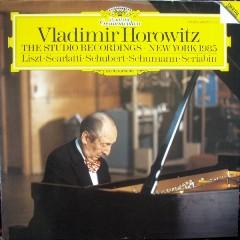Vladimir Horowitz - The Studio Recordings - New York 1985
Vladimir Horowitz - The Studio Recordings - New York 1985

A Schumann - Kreisleriana, Op. 16 31:08
B1 D.Scarlatti - Sonata In B Minor, K.87 (L.33) 4:21
B2 D. Scarlatti - Sonata In E Major, K.135 (L.224) 3:15
B3 F .Liszt - Impromtu ('Nocturne') In F Sharp Major (1872) 3:19
B4 F. Liszt - Valse Oubliée No.1 3:05
B5 A. Scriabin - Etude In D Sharp Minor, Op.8 No.12 2:14
B6 F. Schubert - Impromptu In B Flat Major, D 935 No.3 10:04
B7 F. Schubert - Military March In D Flat Major, D 733 No.1 6:08
Vladimir Horowitz – piano
Even in his late years, Horowitz evokes a Schumann wholly possessed in Kreisleriana, and his Scriabin shows how he could still kindle glowing embers into scorching flame.
For Horowitz's DG debut on record, taken from the soundtrack of the film "The Last Romantic", microphones and cameras went to his New York home (419 045-1GH; CD 419 045-2GH, 5/86). But this second recital is a studio recording, his first for over 12 years, for which his own piano travelled with him after a precarious descent from a second-floor window. Let me say at once that the sound quality could scarcely be bettered.
The date was September 1985, when he was already within sight of his 81st birthday. It would be idle to pretend that the years have taken no toll. One or two stormier climaxes in Kreisleriana, like a few passing details in the concluding March, no longer emerge completely effortless. As an interpreter, too, his desire to shed new light sounds just that bit more forced. But that's by the way. It still remains a graphic reminder of the last great believer in the divine right of keyboard kings.
First unforgettably recorded by him way back in 1969 (RCA—nla), Schumann's Kreisleriana shows him still more responsive to the "positively wild love in some of the movements" (the composer's words), still more aware of the music's startling strangeness, still more attentive to under parts and other hidden voices (not least in No. 1), still more anxious to enrich and intensify melody. There are passing roughnesses, exaggerations, and vagaries of tempo (the beautiful Eusebian No. 4 most notably lacks calm). Yet from first note to last he evokes a Schumann wholly possessed. Scriabin's D sharp minor Etude also shows how he can still kindle glowing embers into scorching flame. Both Scarlatti sonatas are done with exquisite delicacy, even if the B minor pathos of Kk87 finds an outlet in a Chopinesque soundworld. The two Liszt pieces (of which the Impromptu is a new addition to his record repertory) confirm that his finger dexterity and ear for sonority are legendary still. I was less convinced by his somewhat capriciously mercurial approach to the theme and variations of Schubert's B flat Impromptu. Even the Schubert/Tausig Marche militaire (for which Horowitz has provided a still more brilliant ending) has its moments of rhythmic archness. But what a comeback! I can't wait for the concerto album, the collection of Schumann, Chopin and Liszt fantasias, and most of all a recording of his own improvisations already taking shape in his mind. --- Joan Chissell, Gramophone [6/1986]
download: yandex 4shared mediafire solidfiles mega zalivalka filecloudio anonfiles oboom
Last Updated (Saturday, 28 June 2014 20:25)








